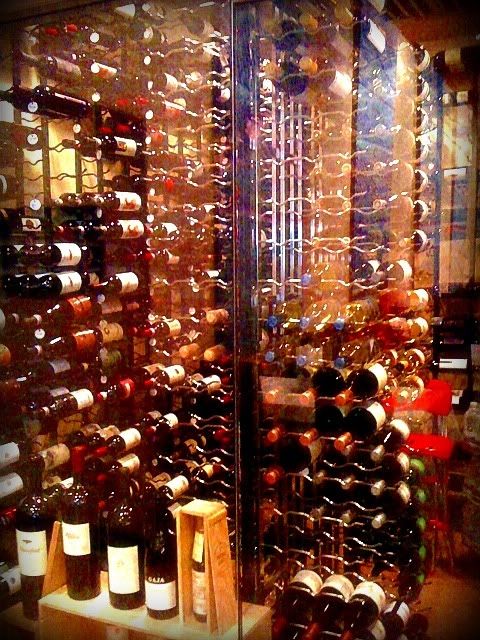For anyone who is even halfway interested in wine, collecting it can be a rewarding venture for both your palate and your wallet. Having a treasure trove of remarkable bottles from which to select is nice enough, but collectors who buy wine as an investment also stand to reap benefits in the future.
A recent article in Homes And Gardens offered a few bullet points on how to start and maintain a serious wine collection.
The first thing to do is decide why you are collecting wine. Do you want to stockpile cases of your favorites? Do you want a collection that will impress your guests? Are you looking to buy wines that will appreciate in value as a financial investment? Answering these questions will determine which wines to pursue, and how much to pay.
Professional guidance is a good idea, especially if you are using wine as an investment. Many wine experts can be retained to act as your adviser. The extent to which an outside source can help depends on your own level of knowledge and your desire to get involved in the process.
If you want to start enjoying your collection right away, seek out older vintages which are known to have quality. If you plan on cellaring your wine for a long time, you can get good prices on wines which are still aging in barrels. Buying wine this way is called buying en primeur, and while the rewards can be big down the road, so are the risks. You don't really own anything until the wine is bottled, so if your winery goes out of business before then, you lose. That's why it's a good idea to stick with well established providers. Still, there's no guarantee you'll make a profit.
Wines from Bordeaux are considered to be good for investors. Chinese collectors are buying so much Bordeaux, prices are being forced up. Burgundy and Rhone wines are considered somewhat riskier. A lot depends on the the vintage.
Once you start acquiring wine, you'll need a place to store it. That little rack in the den isn't going to cut it. If you want to be able to peruse your collection and select a bottle to open from time to time, you'll want to store the wine in your home. A wine cabinet with temperature and humidity controls is a good option if you can't create an actual wine cellar.
Larger collections will require more space, and you may want to check into a wine storage facility for wines which are to be stored for a long time. Proper storage is essential for wines purchased as an investment. Future buyers will want to know the wine was properly handled during the time you owned it, and a "wine hotel" is a great way to assure that.
Proper storage means a constant temperature must be maintained, as temperature variations are the main culprit when stored wine goes bad. Keeping the bottles stored on their sides in a cool place, with minimal handling, is the correct procedure.
Follow Randy Fuller on Twitter.
A recent article in Homes And Gardens offered a few bullet points on how to start and maintain a serious wine collection.
The first thing to do is decide why you are collecting wine. Do you want to stockpile cases of your favorites? Do you want a collection that will impress your guests? Are you looking to buy wines that will appreciate in value as a financial investment? Answering these questions will determine which wines to pursue, and how much to pay.
Professional guidance is a good idea, especially if you are using wine as an investment. Many wine experts can be retained to act as your adviser. The extent to which an outside source can help depends on your own level of knowledge and your desire to get involved in the process.
If you want to start enjoying your collection right away, seek out older vintages which are known to have quality. If you plan on cellaring your wine for a long time, you can get good prices on wines which are still aging in barrels. Buying wine this way is called buying en primeur, and while the rewards can be big down the road, so are the risks. You don't really own anything until the wine is bottled, so if your winery goes out of business before then, you lose. That's why it's a good idea to stick with well established providers. Still, there's no guarantee you'll make a profit.
Wines from Bordeaux are considered to be good for investors. Chinese collectors are buying so much Bordeaux, prices are being forced up. Burgundy and Rhone wines are considered somewhat riskier. A lot depends on the the vintage.
Once you start acquiring wine, you'll need a place to store it. That little rack in the den isn't going to cut it. If you want to be able to peruse your collection and select a bottle to open from time to time, you'll want to store the wine in your home. A wine cabinet with temperature and humidity controls is a good option if you can't create an actual wine cellar.
Larger collections will require more space, and you may want to check into a wine storage facility for wines which are to be stored for a long time. Proper storage is essential for wines purchased as an investment. Future buyers will want to know the wine was properly handled during the time you owned it, and a "wine hotel" is a great way to assure that.
Proper storage means a constant temperature must be maintained, as temperature variations are the main culprit when stored wine goes bad. Keeping the bottles stored on their sides in a cool place, with minimal handling, is the correct procedure.
Follow Randy Fuller on Twitter.

No comments:
Post a Comment